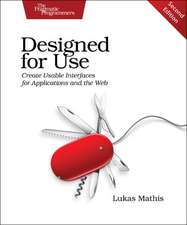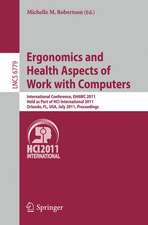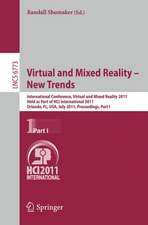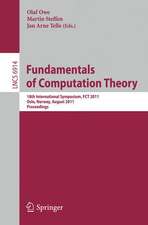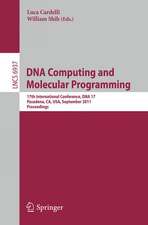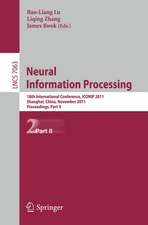Predicting User Performance and Errors: Automated Usability Evaluation Through Computational Introspection of Model-Based User Interfaces: T-Labs Series in Telecommunication Services
Autor Marc Halbrüggeen Limba Engleză Hardback – 28 iul 2017
This new model of user cognition and behavior is implemented using the MeMo workbench and integrated with the model-based application framework MASP in order to provide automated usability predictions from early software development stages on. Finally, the validity of the resulting integrated system is confirmed by empirical data from a new application, eliciting unexpected behavioral patterns.
| Toate formatele și edițiile | Preț | Express |
|---|---|---|
| Paperback (1) | 582.48 lei 38-44 zile | |
| Springer International Publishing – 4 aug 2018 | 582.48 lei 38-44 zile | |
| Hardback (1) | 645.31 lei 6-8 săpt. | |
| Springer International Publishing – 28 iul 2017 | 645.31 lei 6-8 săpt. |
Din seria T-Labs Series in Telecommunication Services
- 15%
 Preț: 640.55 lei
Preț: 640.55 lei - 15%
 Preț: 641.20 lei
Preț: 641.20 lei - 15%
 Preț: 642.83 lei
Preț: 642.83 lei - 15%
 Preț: 639.25 lei
Preț: 639.25 lei - 24%
 Preț: 633.87 lei
Preț: 633.87 lei - 15%
 Preț: 642.03 lei
Preț: 642.03 lei - 15%
 Preț: 644.63 lei
Preț: 644.63 lei - 20%
 Preț: 579.78 lei
Preț: 579.78 lei - 15%
 Preț: 641.53 lei
Preț: 641.53 lei - 15%
 Preț: 644.82 lei
Preț: 644.82 lei - 15%
 Preț: 638.24 lei
Preț: 638.24 lei - 20%
 Preț: 702.56 lei
Preț: 702.56 lei - 18%
 Preț: 999.45 lei
Preț: 999.45 lei - 15%
 Preț: 641.03 lei
Preț: 641.03 lei - 15%
 Preț: 637.46 lei
Preț: 637.46 lei - 18%
 Preț: 719.59 lei
Preț: 719.59 lei -
 Preț: 378.54 lei
Preț: 378.54 lei - 15%
 Preț: 639.08 lei
Preț: 639.08 lei - 15%
 Preț: 637.13 lei
Preț: 637.13 lei - 15%
 Preț: 642.68 lei
Preț: 642.68 lei - 15%
 Preț: 640.06 lei
Preț: 640.06 lei - 15%
 Preț: 652.31 lei
Preț: 652.31 lei - 15%
 Preț: 642.03 lei
Preț: 642.03 lei -
 Preț: 386.61 lei
Preț: 386.61 lei - 20%
 Preț: 552.69 lei
Preț: 552.69 lei - 15%
 Preț: 645.47 lei
Preț: 645.47 lei - 15%
 Preț: 636.94 lei
Preț: 636.94 lei - 15%
 Preț: 642.18 lei
Preț: 642.18 lei - 15%
 Preț: 632.70 lei
Preț: 632.70 lei - 15%
 Preț: 638.24 lei
Preț: 638.24 lei - 20%
 Preț: 648.95 lei
Preț: 648.95 lei - 18%
 Preț: 943.57 lei
Preț: 943.57 lei
Preț: 645.31 lei
Preț vechi: 806.64 lei
-20% Nou
Puncte Express: 968
Preț estimativ în valută:
123.47€ • 128.93$ • 101.96£
123.47€ • 128.93$ • 101.96£
Carte tipărită la comandă
Livrare economică 16-30 aprilie
Preluare comenzi: 021 569.72.76
Specificații
ISBN-13: 9783319603681
ISBN-10: 331960368X
Pagini: 149
Ilustrații: XVI, 149 p. 44 illus., 17 illus. in color.
Dimensiuni: 155 x 235 mm
Greutate: 0.41 kg
Ediția:1st ed. 2018
Editura: Springer International Publishing
Colecția Springer
Seria T-Labs Series in Telecommunication Services
Locul publicării:Cham, Switzerland
ISBN-10: 331960368X
Pagini: 149
Ilustrații: XVI, 149 p. 44 illus., 17 illus. in color.
Dimensiuni: 155 x 235 mm
Greutate: 0.41 kg
Ediția:1st ed. 2018
Editura: Springer International Publishing
Colecția Springer
Seria T-Labs Series in Telecommunication Services
Locul publicării:Cham, Switzerland
Cuprins
Introduction.- Part I Theoretical Background and Related Work: Interactive Behavior and Human Error.- Model-Based UI Development (MBUID).- Automated Usability Evaluation (AUE).- Part II Empirical Results and Model Development: Introspection-Based Predictions of Human Performance.- Explaining and Predicting Sequential Error in HCI With Cognitive User Models.- The Competent User: How Prior Knowledge Shapes Performance and Errors.- A Deeply Integrated System for Introspection-Based Error Prediction.- The Unknown User: Does Optimizing for Errors and Time Lead to More Likable Systems?- General Discussion and Conclusion.
Textul de pe ultima copertă
This book proposes a combination of cognitive modeling with model-based user interface development to tackle the problem of maintaining the usability of applications that target several device types at once (e.g., desktop PC, smart phone, smart TV). Model-based applications provide interesting meta-information about the elements of the user interface (UI) that are accessible through computational introspection. Cognitive user models can capitalize on this meta-information to provide improved predictions of the interaction behavior of future human users of applications under development.
In order to achieve this, cognitive processes that link UI properties to usability aspects like effectiveness (user error) and efficiency (task completion time) are established empirically, are explained through cognitive modeling, and are validated in the course of this treatise. In the case of user error, the book develops an extended model of sequential action control based on the Memory for Goalstheory and it is confirmed in different behavioral domains and experimental paradigms.
This new model of user cognition and behavior is implemented using the MeMo workbench and integrated with the model-based application framework MASP in order to provide automated usability predictions from early software development stages on. Finally, the validity of the resulting integrated system is confirmed by empirical data from a new application, eliciting unexpected behavioral patterns.
This new model of user cognition and behavior is implemented using the MeMo workbench and integrated with the model-based application framework MASP in order to provide automated usability predictions from early software development stages on. Finally, the validity of the resulting integrated system is confirmed by empirical data from a new application, eliciting unexpected behavioral patterns.
Caracteristici
Tackles the problem of maintaining the usability of applications that target several device types at once Proposes a combination of cognitive modeling with model-based user interface development Develops an extended model of sequential action control based on the Memory for Goals theory Includes supplementary material: sn.pub/extras




